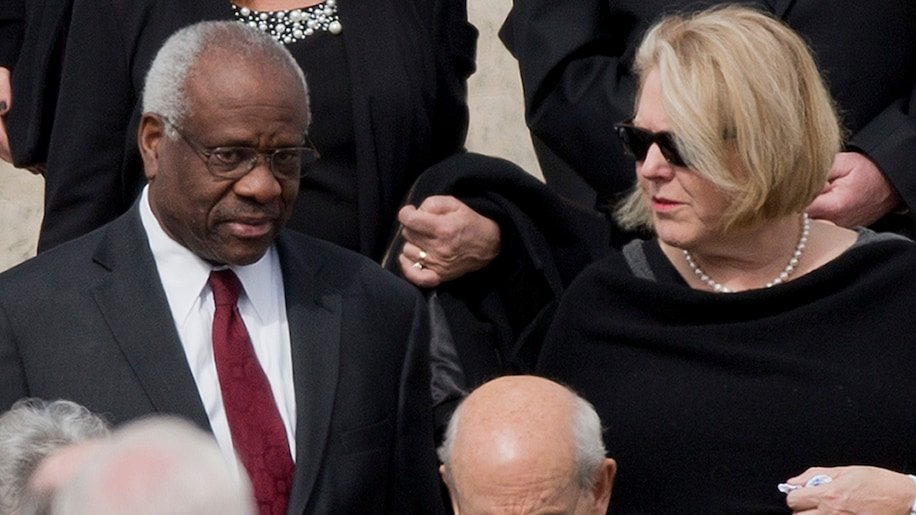Trump lawyers saw Clarence Thomas as key to stop Biden electoral count, emails show
Supreme Court Associate Justice Clarence Thomas and his wife, Virginia Thomas, leave the Basilica of the National Shrine of the Immaculate Conception in Washington after attending the funeral of Supreme Court Associate Justice Antonin Scalia on Feb. 20, 2016. (Pablo Martinez Monsivais/AP)
Thomas is the justice who oversees emergency petitions from the circuit court that includes Georgia.
by Jacqueline Alemany, Spencer S. Hsu and Matthew Brown
Lawyers for President Donald Trump saw Supreme Court Justice Clarence Thomas as key to overturning the results of the 2020 election, according to a set of emails provided to congressional investigators.
Eight emails, ordered released by U.S. District Judge David O. Carter of California, include correspondence between Trump lawyers Kenneth Chesebro, John Eastman and others discussing various legal strategies to convince Republican members of Congress to object to the official certification of electoral votes in a joint session of Congress on Jan. 6, 2021.
In an email from Chesebro to Eastman and several others sent on Dec. 31, 2020, Chesebro argued that Thomas would “end up being key” to asking the high court to overturn then-President-elect Joe Biden’s win in contested states, and that they should “frame things so that Thomas could be the one to issue some sort of stay or other circuit justice opinion saying Georgia is in legitimate doubt.”
“Realistically, our only chance to get a favorable judicial opinion by Jan. 6, which might hold up the Georgia count in Congress, is from Thomas — do you agree, Prof. Eastman?”
Thomas is the justice who oversees emergency petitions from the circuit court that includes Georgia. Eastman did not immediately respond to request for comment.
In an email sent hours later, Chesebro reiterated that he viewed “the best shot at holding up the count of a state in Congress” would be to get a case “pending before the Supreme Court by Jan. 5, ideally with something positive written by a judge or justice, hopefully Thomas.”
Days earlier, Chesebro, on Christmas Eve morning, sent an email to Eastman, Justin Clark, Bruce Marks and others and put the odds of the court taking up the question and issuing a decision at no more than 5 percent — and of it doing so in Trump’s favor by Jan. 6 at “only 1 percent.”
But Chesebro said the “relevant analysis … is political” and “feeding the impression that the courts lack the courage to fairly and timely consider these complaints, and justifying a political argument on Jan. 6.”
Politico first reported on the contents of the new emails.
It’s unclear what litigation the lawyers are referencing in their correspondence. Lawyers for Trump were involved in four ongoing election cases in Georgia during the same period as the emails.
These challenges were a federal case that was ultimately denied at a hearing on Jan. 5, 2021; a case that had been appealed to the Georgia Supreme Court; another being litigated in the superior court of Georgia’s largest county; and a pending case by the campaign that had not yet received a court date. Those cases came after the Georgia Supreme Court dismissed a case brought by the chair of the Georgia Republican Party on behalf of Trump in mid-December 2020. All the remaining cases were withdrawn from court Jan. 7, 2021, after the attack on the Capitol and Biden’s win being affirmed in Congress.
Eastman has argued that the disputed emails were protected by attorney-client privilege — a bedrock principle of U.S. legal practice that says a lawyer must keep confidential what they are told by their clients, and work product related to their representation. Carter cited a “crime-fraud exception” — including instances in which communications were part of a crime — ruling that “the emails are sufficiently related to and in furtherance of a conspiracy to defraud the United States.”
Eastman clerked for Thomas and has remained in touch with his wife, Virginia “Ginni” Thomas, according to email correspondence obtained by the House committee investigating the Jan. 6, 2021, attack on the U.S. Capitol. At least one of the emails showed Ginni Thomas inviting Eastman to speak on Dec. 8, 2020, to a group of conservative activists to provide an update about election litigation.
Ginni Thomas lobbied state legislators in Arizona and Wisconsin via email, urging them to help overturn Biden’s victory, The Washington Post has previously reported. Neither Ginni nor Clarence Thomas appear to be included on any of the newly released email correspondence, and there is no indication in the emails that any of the lawyers directly appealed to Clarence Thomas regarding election litigation.
In another Dec. 31, 2020, email, Eastman expresses concerns about legal issues Trump might face in signing a new verification for a lawsuit that had already been filed regarding voter fraud, given that he has “since been made aware that some of the allegations (and evidence proffered by the experts) has been inaccurate.”
“And I have no doubt that an aggressive DA or US [Attorney] someplace will go after both the President and his lawyers once all the dust settles on this,” Eastman wrote to Alex Kaufman and Kurt Hilbert, two Georgia-based lawyers who were working on Trump’s legal challenges to the election.
It’s unclear what suit Eastman was referencing, but Carter late last month released an 18-page opinion responding to Eastman’s resistance to a subpoena and wrote that he found that several documents sent between Trump’s allies and lawyers showed that the group participated in a “knowing misrepresentation of voter-fraud numbers in Georgia when seeking to overturn the election results in federal court.”
In separate email chains, Hilbert, Kaufman, Eastman, Republican lawyer Cleta Mitchell and others discuss concerns from White House lawyer Eric Herschman about “specific numbers … dealing with felons, deceased, moved” in the complaint they are seeking Trump to sign off on.


